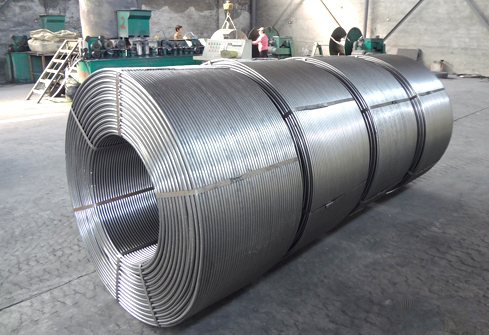
Alloy steel is a cornerstone of modern industries, with its remarkable properties and adaptability driving progress across many sectors. It’s made of iron and carbon, but also includes other elements like nickel, chromium, manganese, and molybdenum. These added elements enhance specific steel properties and make various alloys suited to unique applications.
In its pure form, calcium is highly reactive due to the presence of two valence electrons. It is inclined to donate these electrons, forming chemical bonds in order to complete its full octet of electrons. Pure calcium reacts rapidly with air to form dark, brittle compounds such as calcium oxide and calcium nitride.
In addition to its reactivity, calcium is also a very good conductor of electricity. Unlike the alkaline metals, it is not toxic or carcinogenic and does not burn skin.
Alloys of magnesium with varying amounts of calcium can be used to produce high-quality electrode grids for automobile batteries. The alloys are able to transfer energy more efficiently than their antimony-based counterparts. The alloys also provide longer battery life and are able to be recharged and discharged many times over their lifetimes.
Calcium is a metallic element with the chemical symbol Ca. It is found naturally in limestone, marble, chalk, coral and oyster shells. It is used in making glass, ceramics and plastics. It is also used in antacids and dietary supplements.
Alloys are mixtures of metal elements. They may be homogeneous (consisting of a single phase of identical metallic crystals), heterogeneous (two or more phases), or intermetallic.
A major use for metallic calcium is as an inoculant and deoxidizer for steel. It has a strong affinity for oxygen, nitrogen and carbon and is effective in deoxidizing molten iron. It also helps control graphitic carbon in molten steel. It is also used in the refining of thorium, uranium and zirconium. It is also used as a separating material for gaseous mixtures of nitrogen and argon. American Elements supplies pure metallic calcium in a variety of grades including Mil Spec; ACS, Reagent and Technical Grade; Food, Agricultural and Pharmaceutical Grade; USP and EP/BP.

Pure calcium is a silvery-white metal with high chemical reactivity, but its use as a structural material is limited by low tensile strength. It is therefore often used in the form of calcium compounds, such as calcite or limestone, in industrial applications like cement and electrical insulators. It is also a component of the electrode grids in automotive batteries.
The inventor has selected elements such as nickel, silicon, aluminum and manganese which have a similar affinity to both iron and calcium, and added these to a mixture of calcium and iron in order to make an alloy with the two components. These experimental results show that the resulting iron-calcium alloy is significantly stronger and more corrosion resistant than either pure calcium or the conventional lead-calcium alloy.
Moreover, when the calcium base alloy of this invention is used to add calcium to hypereutectoid and hypoeutectoid steel, it reduces the eutectic/hypoeutectoid % of retained carbon in the final steel ingot, while at the same time increasing the grain size.
Alloy steels are crucial to a variety of industries. The advancements in manufacturing techniques like powder metallurgy and additive manufacturing have enabled the development of new alloys that offer enhanced properties like strength, hardness, and corrosion resistance.
Calcium has a significant impact on the microstructure of the steel, particularly its grain size and distribution. It also reduces the amount of cementite in the metal, which improves tensile strength and ductility. Additionally, it improves the machinability of the metal by increasing its plasticity and improving its tempering stability.
Titanium is an effective deoxidizer and inoculant in steel, and it has a stronger affinity for oxygen, nitrogen, and carbon than iron. It can also improve the mechanical properties of the steel by enhancing its toughness and cold brittleness. Microniobium can also enhance the steel by refining the grain, improving its impact toughness, and decreasing its brittle transition temperature. It also increases the tensile and yield strengths without significantly affecting its plasticity.

Write a Message